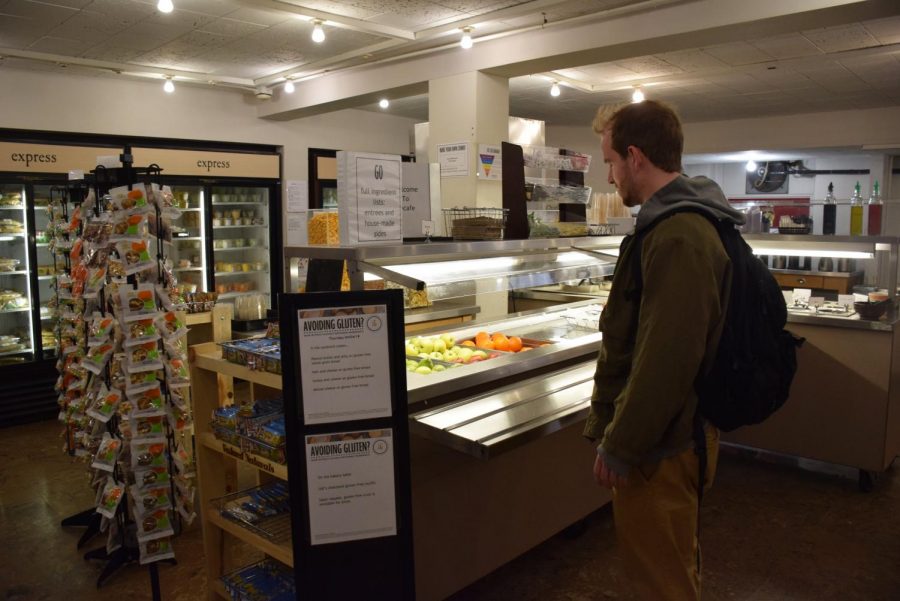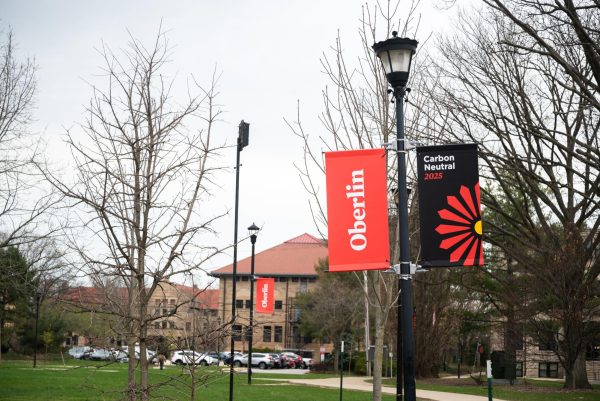Kosher Passover Meals Come to DeCafé
College senior Noah Binford checks out DeCafé’s lunchtime offerings.
With help from both Chabad at Oberlin and Campus Dining Services, DeCafé will now offer kosher food during the week of Passover. Keeping kosher can be more difficult during Passover because the holiday comes with additional dietary restrictions and laws. Additionally, many Jews who do not otherwise keep kosher find it more important to keep kosher during Passover.
Every spring since Chabad opened its doors in 2010, the organization has provided food that meets Passover’s kosher guidelines to students during the holiday.
“We were serving sometimes over a thousand meals in the week, between the Seders and then lunch and dinner everyday — it was a lot of meals,” said Rabbi Shlomo Elkan, the co-director of Chabad. “The College acknowledged a few years ago that that was a big undertaking for Chabad. Chabad funds the whole thing through the generosity of parents and alumni and things like that, just like everything at Chabad.”
Chabad will continue to serve kosher dinner each night of Passover, but this year is the first that kosher selections for Passover lunch will be offered by the College.
“We’ve always offered Passover meals, but making kosher versions of them is challenging from a number of aspects,” wrote Wayne Wood, general manager of the dining hall staff, in an email to the Review. “When Rabbi Shlomo outlined his vision for how we could offer kosher options for Passover observance this year, and offered his help doing so, we were excited to try it.”
DeCafé will offer options in both the Grab & Go section, which can be purchased with meal swipes, and the retail section. Options include pre-made frozen meals as well as house-made ready-to-eat meals prepared on kitchen equipment that CDS bought specially for kosher foods. The kosher options will be offered Sunday through Friday, April 21–26, according to Wood.
“What the College is providing is manpower, and they’re funding it — the lunches and the grocery items,” Rabbi Shlomo said. “[Chabad is] providing a kosher supervision over all of it, to make sure that it meets the highest kosher standard possible, which also increases accessibility. Everybody that keeps kosher for Passover should feel comfortable eating this food.”
College first-year Havi Carrillo-Klein said that, for students like her who observe Passover customs, it can be difficult to find the right foods in the midst of a busy schedule.
“I mean, it’s about religious accessibility, and it can be often challenging to meet those needs, especially because it’s only these eight days in the year and some people celebrate to such a rigorous level,” Carrillo-Klein said. “I think it’s really good that the school paid attention to the fact that students need this.”
Some of the additional restrictions for kosher eating during Passover include not eating anything leavened, or “chametz.” This includes most products that contain wheat, barley, rye, oats or spelt. In addition, food that has come in contact with utensils used for leavened food is not kosher for Passover.
“In the Chabad House case we have totally separate utensils, or we kasher — we make them kosher for Passover through a process, and obviously the College just doesn’t have that infrastructure,” Rabbi Shlomo said. “There’s also lots of different customs, so most Ashkenazi Jews, people from European descent, don’t eat what we call kitniyot, which is anything that has legumes — so like peanuts, beans, lentils, rice, corn.”
Because of this, the College is not able to prepare kosher food from scratch at this time, but the possibility might be open for future years.
“In searching for options this year, Campus Dining Services — with Rabbi Shlomo’s assistance — was able to source kosher items for DeCafé for a pilot program for Passover,” wrote Vice President and Dean of Students Meredith Raimondo in an email to the Review. “We see this as a first step in creating a robust kosher option in Campus Dining, which will require some facilitites investment to realize but which would be an important step in increasing dining access.”
Financial burden was not a huge concern in introducing kosher foods to DeCafé.
“While there are certain expenses associated with preparing and sourcing kosher meals, we have been able to budget carefully and keep costs within financial parameters established by the College,” Wood wrote. “Rabbi Shlomo has been enormously helpful in making this happen, and we are pleased to be able to offer these various kosher and traditional Passover options to Oberlin’s Jewish community.”
For students planning to keep kosher this Passover, the pre-made meals will have a big impact.
“I’m excited,” Carrillo-Klein said. “Just having this available and making it not something you need to stress about on top of your schoolwork and other things you might have to do. It’s really nice to not need to worry about where you’re going to get food, and plus it’s so central to campus.”
Passover is in two weeks, starting on Friday, April 19 and continuing through Saturday, April 27. Chabad at Oberlin is hosting two Passover Seders to mark the beginning of the holiday on Friday, April 19 at 7:30 p.m. and Saturday, April 20 at 8:30 p.m. in the Birenbaum Innovation and Performance Space. To join, RSVP at jewishoberlin.com/passover.







